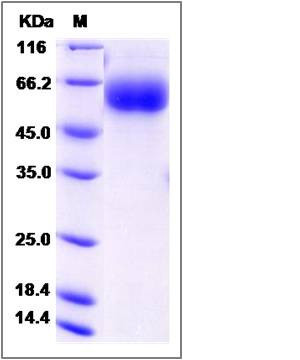Human AMIGO2 Protein (His Tag)
AMIGO2, ALI1
- 100ug (NPP1894) Please inquiry
| Catalog Number | P13735-H08H |
|---|---|
| Organism Species | Human |
| Host | Human Cells |
| Synonyms | AMIGO2, ALI1 |
| Molecular Weight | The recombinant human AMIGO2 consists of 370 amino acids and predicts a molecular mass of 42.3 KDa. It migrates as an approximately 58-63 KDa band in SDS-PAGE under reducing conditions. |
| predicted N | Val 40 |
| SDS-PAGE |  |
| Purity | > 95 % as determined by SDS-PAGE |
| Protein Construction | A DNA sequence encoding the human AMIGO2 (NP_862830.1) (Met1-Thr398) was expressed with a polyhistidine tag at the C-terminus. |
| Bio-activity | |
| Research Area | |
| Formulation | Lyophilized from sterile PBS, pH 7.4 1. Normally 5 % - 8 % trehalose and mannitol are added as protectants before lyophilization. Specific concentrations are included in the hardcopy of COA. |
| Background | AMIGO2 contains Ig-like C2-type (immunoglobulin-like) domain, 6 LRR (leucine-rich) repeats, 1 LRRCT domain and 1 LRRNT domain. It belongs to the immunoglobulin superfamily, AMIGO family. AMIGO2 may mediate homophilic as well as heterophilic cell-cell interaction with AMIGO1 or AMIGO3. It is required for depolarization-dependent survival of cultured cerebellar granule neurons. AMIGO2 may also contribute to signal transduction through its intracellular domain. It may play a role in the tumorigenesis of a subset of gastric adenocarcinomas. AMIGO2 is highly expressed in breast, ovary, cervix, and uterus. |
| Reference |
